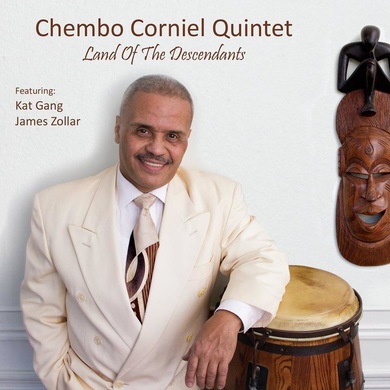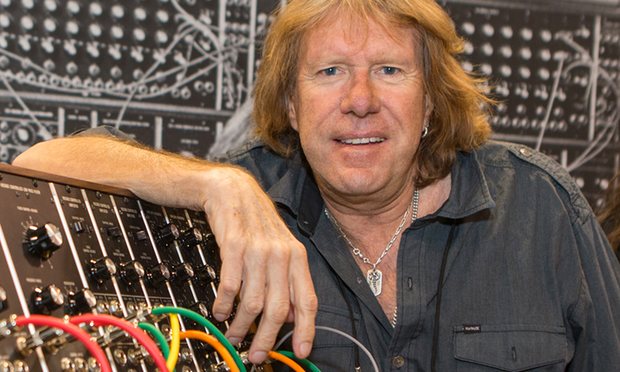 Photo by Jerry Lacay
Photo by Jerry Lacay Three and one-half years later, the Chembo Corniel Quintet has returned with Land of the Descendants (American Showplace Music ASM3108). Of the quintet, only Frank Fontaine (saxophones and flute) and Chembo himself remain. But don’t lose heart, this incarnation of the Quintet has lost nothing in the exchange and the Master is still the Master.
With percussionist Chembo Corniel are, as mentioned, Frank Fontaine, who composes and arranges two songs and arranges Chembo’s original plus Billy Strayhorn’s Lush Life, and Darwin Noguera on acoustic piano, Ian Stewart on electric bass and drummer Joel Mateo who contributes an original composition/arrangement of his own. Guest artists include Kat Gang—who is the vocalist for Lush Life—and James Zollar on trumpet, in addition to several other percussionists. Fontaine is the chief arranger for Land of the Descendants, the role played by pianist Elio Villafranca for Afro Blue Monk.
The idea behind Land of the Descendants is stated by Chembo himself, saying, “I am proud to embrace and transmit what has been passed on to me… Land of the Descendants, a reflection of the here and now, deeply rooted in the African-based rhythms and Nuyorican Jazz. It is my contribution to the growing body of work that represents our musical heritage.”
Chembo draws on music from Strayhorn to Sonny Stitt to contemporary composers and artists to create the feeling of our inherited culture and how we can build and expand that culture without conquest but through a shared understanding of what touches us all. We are all descendants and we owe a debt that cannot be repaid except through perpetuation.
Descendants—composed and arranged by Takeo Heisho—opens the album. James Zollar makes the first of four appearances on this piece, along with Victor Rendon and Cascadu, both on the batás. The introduction is provided by the piano and bass with the whole group jumping in with great and joyous rhythms. The pace is electrifying and Fontaine and Zollar bring the brass with flair and bravado. Zollar’s trumpet trills is exciting stuff.
All the while, pianist Darwin Noguera keeps a minimalist melodic line that rolls heavy with the percussionists. There is a brief period, near the beginning, that is almost a moment of meditation, only to be exploded into those smoking rhythms and horns.
Now this is how to kick off an album.
El Antillano, composed and arranged by drummer Joel Mateo, creates a great dialogue between Fontaine’s sax and Noguera’s piano. The rolling then galloping rhythm set by Chembo is met with the percussive playing of Fontaine and Noguera. A rhythmic delight.
Chembo’s original, Transparent Souls, opens with a lovely piano introduction that sounds like it came from 1950s Havana. The swing and movement of the piano is brilliant and the flute and violin create the perfect harmony for the tango rhythms that swell.
The flavors of African rhythms and Latin melodies are easily seen and experienced through the transparency of our mixed and enriched culture. The wonderful tonality of Chembo’s playing is rich against the smooth but vibrant playing of the rhythm section. This may be my favorite piece on the whole album.
Straddling the track list are two standout Jazz classics: Lush Life by Billy Strayhorn and Night Letter by Sonny Stitt. Lush Life has the added attraction of Kat Gang’s single vocal appearance on the album. Pianist Darwin Noguera arranged the standard for the album. Ms. Gang is a wonderful guest artist and contributes such cool Jazz delivery. Noguera is equal to the task of accompaniment with delicate touch and phrasing. Ian Stewart’s bass is smooth and supportive.
The easy percussion accentuates the dance-step embrace of the quintet’s movement. The understated rhythm is like a whisper that commands attention.
Stitt’s Night Letter follows with the funky twists of Stewart’s bass intro that opens the portals for the quintet’s solid swing. As surely as Strayhorn contributed to our land of descendants’ culture and spirit, Sonny Stitt’s forthright swing and swagger is equally important to who we are.
The rip of the sax, the runs of the piano and the throbbing bass with set-upon drums reveal what is solid in us and what allows for the open-hearted proclamations of sax and trumpet—our voices heard loudly as we endeavor to speak truth to one another.
Two pieces by Frank Fontaine follow. Bottoms Up is a tongue-in-cheek summersault of bass and percussion overtop the melodies. The deep bass gets a prime spotlight in what must be Stewart’s most prominent moments on the album. The piano reacts in melodic intensity while the bass drops down with the percussion and makes clear space for brief moments of sax interruption. The broken five-counts are ear-catching and memorable.
Parisian Cha, Fontaine’s second original, provides a great exchange for Zollar and Fontaine while the rhythm section gives a clinic in the straightforward cha-cha-cha so adored everywhere, always and by all. The percussiveness of the piano with its melodic breaks keeps the rhythm with the drums and bass as Chembo solos magnificently.
The album concludes with Rick Faulner’s Newtown. The sax of Frank Fontaine is set against a full-set rhythm section of Chembo and Mateo along with Yasuyo Kimora on cajón base and Ken Yanabe on cajón repicador.
Noguera has perhaps his most impressive moment in the middle section over against Fontaine’s mournful sax. The playfulness and smothered by the melancholy and regret. The heartbeats slow to silence in the end.
This, too, is who we are and what we share: the grief, the joy, the laughter, the tears. It is a shared heritage that we adopt and to which we adapt. We are all descended from Africa and the African-based rhythms touch us on our deepest levels. Our melodies come from all over the globe but our rhythms have a foothold in our place of shared origins.
In the Land of the Descendants, we can rejoice in our shared and unsheltered culture. It reminds me of the lines from the poet Rumi, "Come, whoever you are. Wanderer, worshiper, lover of leaving. It does not matter. Ours is not a caravan of despair. Come, even if you have broken your vows a thousand times. Come, yet again. Come, come."
Listening to Chembo Corniel and his Quintet is an experience in understanding, compassion and love.



 RSS Feed
RSS Feed
